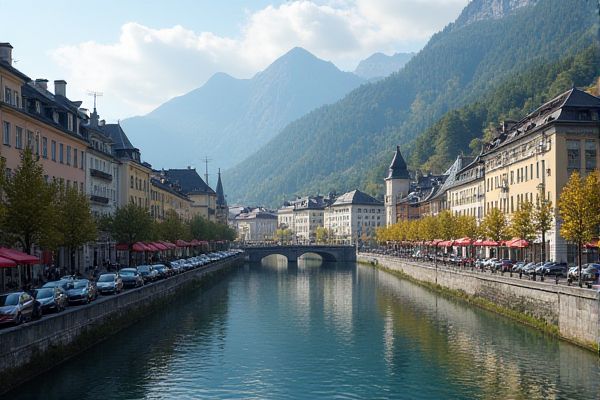
What to know as new resident in Austria: Register residence within 3 days. Obtain Austrian Meldezettel. Health insurance is mandatory. Learn basic German phrases. Public transport is efficient. Recycling is strictly regulated. Cost of living varies by city. Understanding Austrian etiquette helps. Enjoy local cuisine specialties. Public holidays celebrated country-wide.
Register residence within 3 days.
When moving to Austria, you must register your residence within three working days of moving into your new address. This involves scheduling an appointment at a resident registration service center, presenting required documents such as a valid identity card or passport and a completed residence registration form signed by your landlady or landlord, and receiving a registration certificate upon completion. For more detailed information, visit the Residence Registration page on Housing Anywhere's website to ensure a smooth transition into your new home.
Obtain Austrian Meldezettel.
To obtain an Austrian Meldezettel, you must fill out the application form, have your landlord or main tenant sign it, and submit it along with your passport to a Residence Registration Service Center within three days of moving into your new residence. The process is free, and you will receive a Meldebestatigung (registration confirmation) upon completion. For more detailed guidance, you can refer to the EU Citizens: How to Get a Meldezettel Address Registration in Vienna blog on You-Work. This essential step ensures your legal residency in Austria is documented correctly and efficiently.
Health insurance is mandatory.
Health insurance is mandatory in Austria for anyone residing there for more than six months, including employees, freelancers, retirees, and students. Public Health Insurance, which covers most residents, is automatically provided through employers for employees, while others may choose between public and private options. For detailed information about requirements and options in Austria, visit the Housing Anywhere website, which provides comprehensive insights on how to navigate health insurance during your stay in Austria.
Learn basic German phrases.
To navigate Austria as a new resident, it's essential to learn some basic Austrian German phrases such as greetings (e.g., "Guten Morgen" for "Good morning"), introductions (e.g., "Ich heisse..." for "My name is..."), and useful expressions like "Danke" for "Thank you" and "Entschuldigung" for "Excuse me." Becoming familiar with the unique vocabulary and grammar rules of Austrian German, which differ slightly from standard German, will be beneficial. For more detailed guidance, visit the Beginner Austrian Guide to enhance your language skills and cultural understanding.
Public transport is efficient.
Public transport in Austria is highly efficient, with a safe, extensive, and reliable network of trains, trams, and buses that cover most areas, making it a popular and affordable way to commute. Services operate nearly 24 hours a day, and there are various discounts and passes available, enhancing the convenience for travelers. For more detailed information, explore the comprehensive guide on Austria Transport to know all about the extensive and efficient public transportation system in the country.
Recycling is strictly regulated.
In Austria, recycling is strictly regulated under the Austrian Abfallwirtschaftsgesetz (Waste Management Act), emphasizing waste prevention, sorting, and recycling. Households must sort and recycle waste, with most materials like glass, plastics, metals, and organic waste being recyclable, and municipalities handle the collection and recycling processes which can vary regionally. For more detailed information, you can refer to the comprehensive guidelines available on the official Austrian Government Website. These regulations ensure efficient waste management and contribute significantly to environmental sustainability in the country.
Cost of living varies by city.
The cost of living in Austria varies significantly by city, with Vienna, Salzburg, and Innsbruck being the most expensive, while cities like Graz and Linz are more affordable. For example, the total monthly living costs in Vienna can be around EUR2,218, compared to EUR2,028 in Salzburg and EUR2,058 in Innsbruck, excluding rent. To get more detailed insights into living expense variations across different cities in Austria, you can visit the Cost of Living in Austria page.
Understanding Austrian etiquette helps.
Understanding Austrian etiquette involves being punctual, using formal titles and last names, shaking hands and making eye contact, dressing well, and following specific rules for greetings, dining, and public behavior to avoid awkward interactions and integrate smoothly into Austrian society. Key practices include using titles like "Herr" and "Frau," making formal greetings, and adhering to strict rules for table manners and public conduct. For more in-depth insights, check out this comprehensive guide on Austrian Etiquette, which will help you navigate cultural nuances with ease.
Enjoy local cuisine specialties.
As a new resident in Austria, you should try iconic dishes like Wiener Schnitzel, Tafelspitz, Erdapfelsalat, Goulash, and desserts such as Kaiserschmarrn and Sachertorte, which are integral to Austrian cuisine and offer a rich culinary experience. For more information on these delightful foods, visit Delicious Austrian Dishes, where you can explore the diversity and flavors that make Austrian cuisine truly remarkable.
Public holidays celebrated country-wide.
In Austria, there are 13 public holidays observed nationwide, including New Year's Day, Epiphany, Easter Monday, Labour Day, Ascension Day, Whit Monday, Corpus Christi, Assumption Day, Austrian National Day, All Saints Day, Immaculate Conception, Christmas Day, and St. Stephen's Day, each with its own unique traditions and celebrations. For a detailed overview of these holidays, you can explore the Advantage Austria website. These public holidays provide a glimpse into the rich cultural heritage and communal spirit of Austria, offering both residents and visitors a chance to participate in a wide spectrum of festivities.
